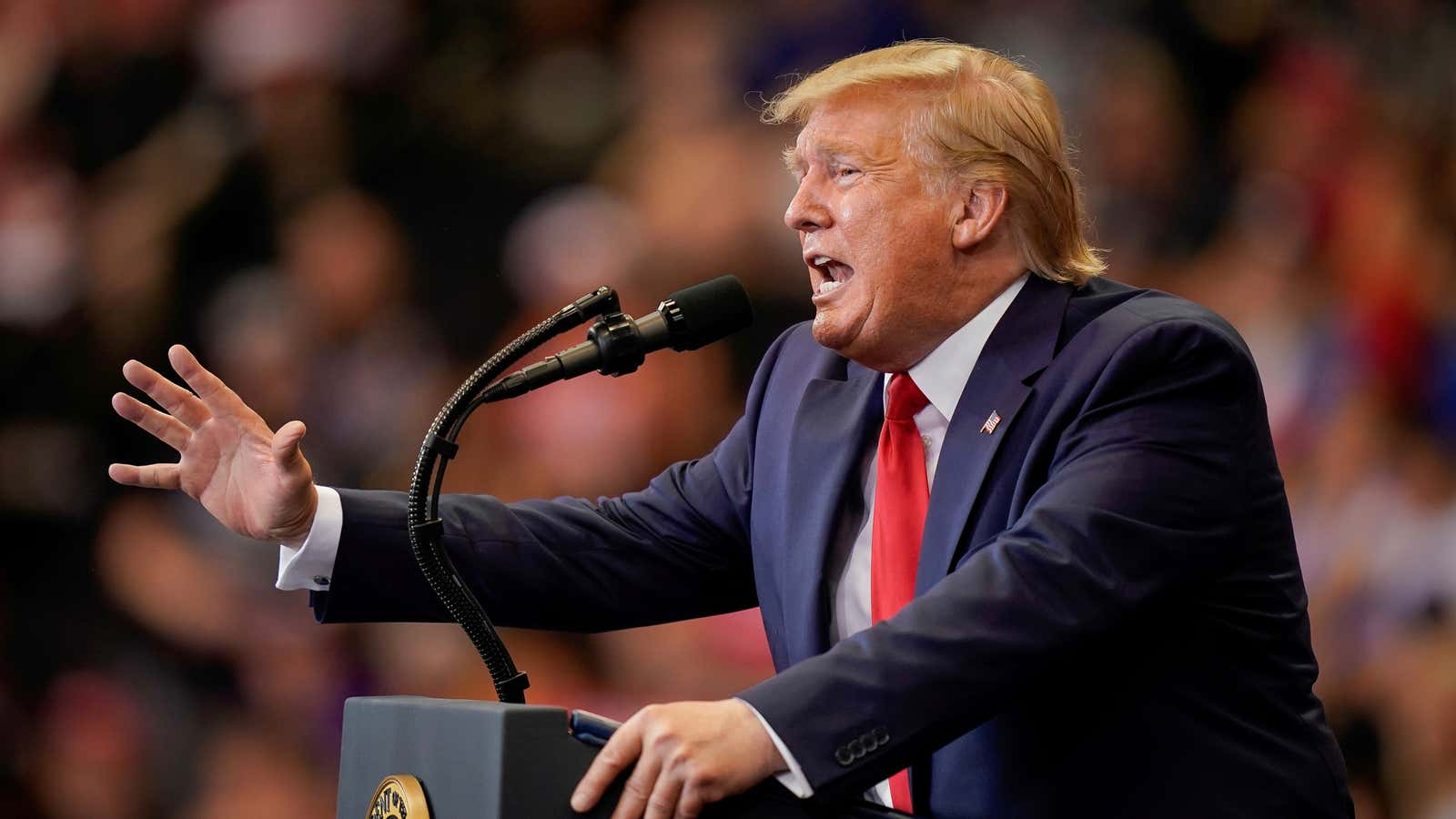Social media platforms are the equivalent of the public square of yore.
Politicians on Twitter can talk to the people directly and they can reply, issue statements, and take jabs at each other. However, these words that win politicians their support can and will also be used against them in court. No one knows this better than US president Donald Trump.
Trump’s tweets have won him lots of followers, but they’ve also been used against him in lawsuits to show the discriminatory intent behind ostensibly neutral policies, like his executive orders banning people from Muslim-majority countries, which were outwardly premised on national security concerns. Now the president is taking what he’s learned on the legal defense and applying it to his offense.
The president filed a lawsuit on Aug. 6 challenging new legislation passed by California Democrats that would require all presidential candidates to disclose their previous five years of tax returns to appear on the state’s presidential ballot. Trump says the new law is targeting him personally and in the 15-page complaint, his lawyers argue that the US Constitution provides the exclusive requirements for presidential candidacy—natural born citizenship, a minimum of 35 years of age, and 14 years of residency in the US—and that states can’t “supplement” these.
The filing also argues that the new law is a violation of the First Amendment.
“In passing the law, Governor Newsom and the Democrats in the California legislature who voted for it made clear that they were retaliating against President Trump for his political associations and speech,” the complaint states.
To support the retaliation claim, the complaint relies on statements made by 2016 presidential candidate Hillary Clinton during the campaign, as well as a slew of tweets from California legislators. It notes that before California governor Gavin Newsom was elected in 2018—but after his campaign for office began—he tweeted, “Folks think @realDonaldTrump is avoiding tax release because he pays a very low rate. I think [it’s] because his finances are a house of cards.” In September, prior to Trump’s election, Newsom twice tweeted “at” Trump about his failure to disclose his taxes.
For his part, Trump contends in the complaint that he provided more than 90 pages of information about his assets and liabilities and that he has fulfilled all financial disclosure requirements. His claim is that tax disclosure would interfere with ongoing IRS audits, a position that has hardly reassured political opponents that the president has nothing untoward to hide.
Presidential candidates have for decades voluntarily disclosed taxes, so Democrats continued to press for Trump’s returns after he was elected. A version of the California tax return bill, drafted by state senators Mike McGuire and Scott Wiener, was approved by state representatives but ultimately vetoed by former governor Jerry Brown in October 2017. The Trump complaint makes much of the fact that the Democratic governor called it a ‘slippery slope” and questioned its constitutionality.
McGuire and Wiener advanced another bill in 2018. Wiener tweeted about it at the time and the Trump complaint argues that the tweet shows this is politically-motivated legislation, even if the bill appears neutral, impacting Democratic and Republican candidates alike.
But the arguments in the filing have not deterred Wiener from tweeting. On the day Trump filed suit, Wiener responded with another tweet.
A winning strategy?
The state senator may well be taking a page from the Trump playbook. The president tweets relentlessly. That his proclamations end up as evidence against him in litigation, including a defamation case based on a Trump tweet filed by the adult film star known as Stormy Daniels, has not stopped him.
Perhaps that is because, so far, Trump has ultimately won many of his legal battles. In the defamation case, for example, the judge determined that Trump’s tweets were only hyperbolic, and that lively debate is “essential to American discourse.”
In the “Muslim ban” cases, opponents of Trump’s executive orders argued that his tweets showed discriminatory intent and were based on anti-Muslim sentiment although the orders officially spoke only of national security. While the Ninth Circuit found the executive orders were based in “animus,” considering Trump’s statements, the US Supreme Court majority ultimately ruled a version of the executive order was legitimate. Chief justice John Roberts wrote, “It cannot be said that it is impossible to ‘discern a relationship to legitimate state interests’ or that the policy is ‘inexplicable by anything but animus.’”
The four dissenting justices disagreed and argued that the majority was ignoring the larger context, including tweets. “[Taking] all the relevant evidence together, a reasonable observer would conclude that the Proclamation was driven primarily by anti-Muslim animus,” Sonia Sotomayor wrote.
Now Democrats in California will have to find a way to replicate Trump’s success in swatting away complaints arguing that tweets show true intent.
